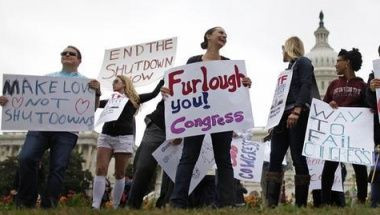Government Shutdown 2013: What Are The Most At-Risk States For Federal Employees, Veterans, Small Business Owners And Mortgage Holders

As the U.S. government's partial shutdown moves into its third week and the debt ceiling deadline approaches, Democrats and Republicans remain deadlocked over a deal that could save America and the world from what some analysts are saying could trigger a financial crisis far worse than the 2008 recession.
Some of the country’s major federal landmarks have reopened because of state funding, including the Statue of Liberty and the Grand Canyon, which will cost New York and Arizona $60,000 and $100,000 a day, respectively.
Other states are weighing whether they can afford to do the same, but according to WalletHub’s Shutdown Report, "Most & Least Affected States," some states are feeling the pinch of the shutdown more than others. The report looks at states with the highest concentration of federal employees and federal contracts as well as states that rely most heavily on federal assistance and programs – those with the most students, senior citizens, veterans and small business owners.
“It’s becoming increasingly obvious that the impact of this forced hiatus will extend far beyond the 800,000 federal workers who are currently on furlough,” said Odysseas Papadimitriou, CEO of the personal finance websites WalletHub and CardHub.
The report named the District of Columbia, Maryland, Alaska, Hawaii and Virginia as having the most federal workers per capita and therefore disproportionately affected by the partial shutdown. Other findings include:
Small business owners from the Dakotas, Colorado, Alaska and Michigan who are looking for funding are hurt most by an inability to get Small Business Administration loans, as those states have displayed the highest small business borrowing rates in recent years.
Officials in West Virginia, Maine, Arkansas, Alabama and Vermont should be particularly concerned about a prolonged shutdown, as their states have the most senior citizens per capita.
Delayed mortgage closings will have the largest impact on Hawaii, Florida, Arizona, Maryland and Louisiana – the five states in which real estate accounts for the greatest portion of gross product.
Alaska, Virginia, Montana, Wyoming and Maine have the most veterans per capita and would therefore suffer most from a lack of Veterans Administration funding, which could result from a drawn-out shutdown.
"And while we’re all losers in this situation, it’s interesting to note that Republican-leaning states stand to suffer the most,” said Papadimitriou. “From senior citizens and veterans who aren’t getting their Social Security and VA checks, to students and small business owners whose loan applications go unfulfilled, there will be plenty of angry constituents for politicians to answer to.”
© Copyright IBTimes 2024. All rights reserved.





















